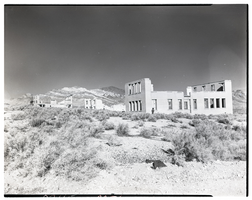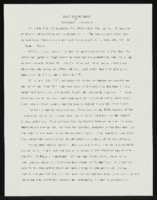Search the Special Collections and Archives Portal
Search Results
Albert Purdue oral history interview
Identifier
Abstract
Oral history interview with Albert Purdue conducted by Claytee D. White on August 16, 2000 for the Boyer Early Las Vegas Oral History Project. Purdue begins by explaining the importance of the railroad industry and specifically the Union Pacific Railroad Company to early Las Vegas, Nevada. He discusses his family's military history and the presence of the military in Nevada during the 1940s for desert training for the North African front during World War II. He gives an overview of life in Las Vegas from the 1940s to the 1960s, and discusses how the city has changed and what the future of the city may look like. Purdue talks about when the casinos of Las Vegas were controlled by organized crime and when Howard Hughes arrived and began buying properties. Purdue also discusses racial segregation in Las Vegas and the diverse peoples who live in the city.
Archival Collection
Earl McDonald oral history interview
Identifier
Abstract
Oral history interview with Earl McDonald conducted by Claytee D. White on October 4, 2000 for the UNLV University Libraries Oral History Collection. In this interview, McDonald, a sixty-year resident of Las Vegas, Nevada, relates his background in Mississippi and Louisiana, leaving home at fourteen and traveling to California, and being drafted into the Army during World War II. He then discusses moving to Las Vegas and working as a musician and valet while training to be an electrician. He talks at length about the Westside, detailing the clubs and restaurants that opened along Jackson Street, including the El Rio, the Cotton Club, the El Morocco, and the Ebony Club. He also explains the discrimination that prevented Black individuals from joining unions even when they worked union jobs, and the response by the United States Justice department. He also discusses gambling and the potential for revitalizing the Westside community.
Archival Collection

Film transparency of the ruins of several buildings, Rhyolite, Nevada, November 25, 1948
Date
Archival Collection
Description
Image
University of Nevada, Las Vegas Department of Health and Physical Education Records
Identifier
Abstract
The University of Nevada, Las Vegas Department of Health and Physical Education Records (1957-1997) is comprised of University of Nevada, Las Vegas records primarily dealing with the reorganization of departments from 1994-1997. Materials include national studies, internal memos, newspaper articles, public correspondences, and histories of the university, relevant departments, and professors.
Archival Collection
Audio clip of interview with Sharon Walker by Barbara Tabach, October 8, 2014
Date
Archival Collection
Description
Part of an interview with Sharon Walker on October 8, 2014. In this clip, Sharon Walker is talks about family and life in Las Vegas.
Sound

Transcript of Interview with Barbara Kirkland
Date
Archival Collection
Description
On a sunny day in 1946, the train from Shreveport, Louisiana, stopped at The Plaza hotel in downtown Las Vegas like it always did. But on this particular day, Atha Toliver and her only child, twelve-year-old Barbara, stepped off the train and onto the dusty Western street of Fremont. Narrator Barbara Bates Kirkland recalls that event and living in Las Vegas for most of the next seven decades during this 2004 interview. Like many others who migrated from the South, Barbara Kirkland’s mother would find employment as a maid. A friend who already lived in Las Vegas had told her of the good paying jobs as private maid. So Atha who was determined that her daughter would get an education and a finer future saw this as her opportunity to achieve this for her daughter. Later, the entrepreneurial and creative mother opened Eva’s Flower Basket, a floral shop that Barbara operates in her retirement from teaching. Barbara returned to Louisiana for her senior year in high school, attended Southern University in Baton Rouge, and then returned to Las Vegas to teach first grade at Westside School. Barbara was active in the community, was a founding member of Les Femmes Douze, involved with Zion United Methodist Church and was friends with many of the early African American community leaders at the time. She talks about these, describes various neighborhoods where she lived and about raising her own two children in Las Vegas. Barbara was a founding member of Les Femmes Douze. AKA/Akateens.
Text

"Billy Bob and Leroy": article draft by Roosevelt Fitzgerald
Date
Archival Collection
Description
From the Roosevelt Fitzgerald Professional Papers (MS-01082) -- Drafts for the Las Vegas Sentinel Voice file. On a different future for Black veterans as opposed white counterparts.
Text
Henderson Toastmistress scrapbooks, 1965-1976
Level of Description
Archival Collection
Collection Name: International Training in Communication, Vegas Valley Club Chapter Records
Box/Folder: Box 02
Archival Component
Nevada salary and wage surveys, 1984 to 1991
Level of Description
Archival Collection
Collection Name: Joan Kane Collection of Casino Training Manuals
Box/Folder: Box 01
Archival Component
